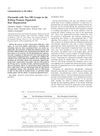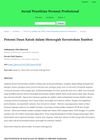 13 citations,
August 2019 in “Biological & Pharmaceutical Bulletin”
13 citations,
August 2019 in “Biological & Pharmaceutical Bulletin” Certain flavonoids help grow back colored hair after skin injury.
 1 citations,
January 2016 in “Springer briefs in molecular science”
1 citations,
January 2016 in “Springer briefs in molecular science” I'm sorry, but there's no information provided for me to summarize.
 May 2020 in “Jurnal Penelitian Perawat Profesional”
May 2020 in “Jurnal Penelitian Perawat Profesional” Katuk leaves may help prevent hair loss.
 6 citations,
June 2017 in “Asian journal of beauty & cosmetology”
6 citations,
June 2017 in “Asian journal of beauty & cosmetology” Rosa multiflora root extracts may help promote hair growth and have anti-aging benefits.
 5 citations,
June 2018 in “Records of Natural Products”
5 citations,
June 2018 in “Records of Natural Products” Garden cress extract may help treat skin inflammation and androgen-related disorders.
 9 citations,
June 2022 in “Reviews in Environmental Science and Bio/Technology”
9 citations,
June 2022 in “Reviews in Environmental Science and Bio/Technology” Maritime pine bark has various chemical components useful for different industrial uses.
 2 citations,
January 2022 in “Rasayan journal of Chemistry”
2 citations,
January 2022 in “Rasayan journal of Chemistry” Compounds from the Sansevieria trifasciata plant might be effective for treating hair loss.
March 2022 in “Journal of drug delivery and therapeutics” Sea hibiscus leaf extract at 30% concentration in a hair tonic significantly increased hair growth in guinea pigs.
 2 citations,
January 2023 in “BioMed Research International”
2 citations,
January 2023 in “BioMed Research International” Beetroot extract nanogel may help treat hair loss caused by testosterone.
 37 citations,
January 2019 in “Food science & nutrition”
37 citations,
January 2019 in “Food science & nutrition” Bergamot may improve heart health, skin conditions, and mood, but more research is needed to confirm these benefits.
2 citations,
August 2022 in “Animals” Essential oils may improve dogs' health and melatonin can help with their sleep and anxiety, but both should be used carefully.
 23 citations,
January 2017 in “Journal of Oleo Science”
23 citations,
January 2017 in “Journal of Oleo Science” Supercritical CO2 extraction makes rice bran oil healthier and safer than traditional methods.
 June 2022 in “Pflügers Archiv - European Journal of Physiology”
June 2022 in “Pflügers Archiv - European Journal of Physiology” The enzyme sEH is important for hair growth and its inhibition could help treat hair loss.
 1 citations,
April 2018 in “Our Dermatology Online”
1 citations,
April 2018 in “Our Dermatology Online” Massaging the scalp with a cosmetic containing certain natural inhibitors can significantly regrow hair in men with pattern baldness.

Cold-pressed rapeseed oil is most resistant to oxidation and certain oils may reduce chronic disease risk; consumers like the taste of pumpkin oil best.
 December 2023 in “Journal of Cosmetic Dermatology”
December 2023 in “Journal of Cosmetic Dermatology” The hair growth product was effective and safe, increasing hair growth, thickness, and density while reducing hair fall.
 2 citations,
October 2020 in “BioMed Research International”
2 citations,
October 2020 in “BioMed Research International” Phaeodactylum tricornutum extract helps hair follicle cells grow by activating the ERK1/2 pathway.
 14 citations,
January 2020 in “Skin appendage disorders”
14 citations,
January 2020 in “Skin appendage disorders” A shampoo with cannabidiol can significantly reduce scalp inflammation and symptoms in people with mild to moderate psoriasis or seborrheic dermatitis.
 7 citations,
March 2013 in “PubMed”
7 citations,
March 2013 in “PubMed” A new hair loss treatment with two unique ingredients improved hair growth.
 May 2024 in “Journal of functional foods”
May 2024 in “Journal of functional foods” Coffee bean residue extract helps hair growth by activating cell processes.
 27 citations,
September 2017 in “Journal of Medicinal Food”
27 citations,
September 2017 in “Journal of Medicinal Food” Annurca apple supplement safely increases hair growth and keratin in humans.
 17 citations,
January 2020 in “Skin appendage disorders”
17 citations,
January 2020 in “Skin appendage disorders” Certain diets may help with hair growth in people with different types of hair loss.
 8 citations,
January 2017 in “Elsevier eBooks”
8 citations,
January 2017 in “Elsevier eBooks” Certain nutrients can help keep skin healthy as we age.
10 citations,
March 2010 in “Journal of Food Biochemistry” Tamarind seed coats have strong antioxidant properties and could be used in health products and food preservatives.
 1 citations,
December 2022 in “Türk tarım - gıda bilim ve teknoloji dergisi”
1 citations,
December 2022 in “Türk tarım - gıda bilim ve teknoloji dergisi” Diversifying tea products can boost profits and meet global market demands.
 October 2024 in “International Journal of Ayurveda Research”
October 2024 in “International Journal of Ayurveda Research” Emblica officinalis and Eclipta alba may help treat hair loss naturally.
 11 citations,
March 2018 in “Protoplasma”
11 citations,
March 2018 in “Protoplasma” Lipopolysaccharides boost wheat seedling growth, but procyanidin B2 weakens this effect.
 January 2023 in “International journal of advances in scientific research and engineering”
January 2023 in “International journal of advances in scientific research and engineering” Anthocyanins from fruits and vegetables may help prevent and treat colorectal cancer safely.
 1 citations,
June 2022 in “Pakistan biomedical journal”
1 citations,
June 2022 in “Pakistan biomedical journal” Pumpkin seeds are nutritious and can improve health, making them useful for cheaper, sustainable food.
August 2024 in “Cosmetics” Peanut callus extract helps grow hair and prevent hair loss.


























